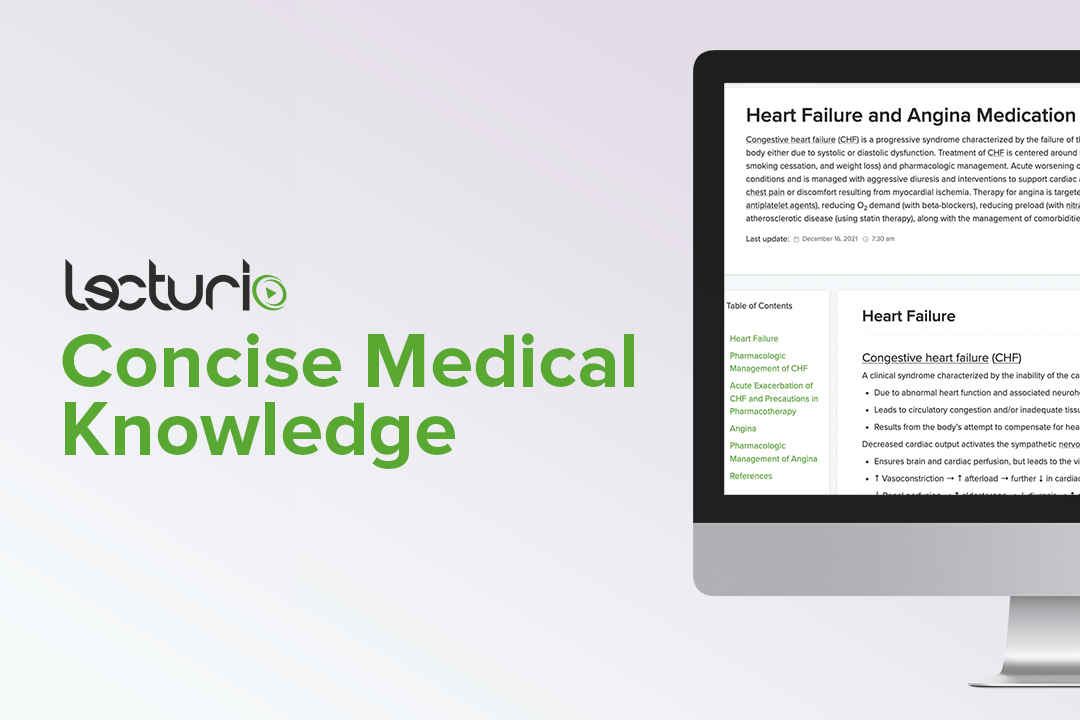Playlist
Show Playlist
Hide Playlist
Vasodilators – Heart Failure and Angina Management
-
Slides Vasodilators Heart Failure Angina Management.pdf
-
Reference List Pharmacology.pdf
-
Download Lecture Overview
00:01 Let's talk about direct vasodilators. Nitrates like nitroglycerin are often used. 00:07 Nitroprusside promotes a more balanced venous and arterial dilation, in contrast to nitrates, which are weighted more toward venodilation. This not only lowers blood pressure, but also reduces left ventricular filling pressures and reduces afterload. 00:24 It is no surprise, then, that this medication is useful in the management of acute heart failure, hypertensive emergency, and other conditions requiring acute modulation of blood pressure (such as aortic dissection). 00:36 Major concerns with this drug include its metabolism to cyanide, reflex tachycardia, and rebound vasoconstriction upon discontinuation. Therefore, the use of this medication is typically limited to less than 24–48 hours. 00:54 Other direct vasodilators include hydralazine and isosorbide dinitrate. 00:59 You can use both in combination. They do reduce mortality in African American patients in a major study that was released in the United States some years ago. 01:11 Calcium channel blockers are also sometimes used, but not in heart failure. These are more angina type medications. 01:18 Remember that the dihydropyridine and the non-dihydropyridine drugs differ in that one works on the heart and one doesn't. 01:27 There is no use in reducing inotropy, so that's not particularly helpful. 01:31 Peripheral vasodilation can help in terms of calcium channel blockers, but it also causes a reflex tachycardia, so we don't use it as much in heart failure. 01:45 Loop diuretics are a mainstay in heart failure treatment. I won't go into too much detail about diuretics as a whole because I've discussed them in detail in the hypertension lecture. 01:57 But to make a long story short, furosemide is probably used the most in acute heart failure, and it can also be used, and easily titrated in chronic heart failure too. 02:08 If a patient is allergic to furosemide, we sometimes use ethacrynic acid. 02:13 Other diuretics include the thiazide diuretics like hydrochlorothiazide and metolazon. 02:18 Metolazone is typically preferred in heart failure, and these thiazide diuretics may be added to loop diuretic therapy for cases of hypervolemia which are unresponsive to diuretic monotherapy. 02:30 Amongst the thiazide diuretics, chlorthalidone is superior to hydrochlorothiazide for hypertension. 02:36 Chlorthalidone is the preferred thiazide diuretic for hypertension due to prolonged half-life and proven reduction of cardiovascular disease risk. 02:45 Potassium-sparing diuretics are also used as well. 02:49 Amiloride, spironolactone, and triamterene. 02:52 Once again, I covered these medications in the hypertension lecture But these are really good to reduce afterload and to reduce hypervolemia.
About the Lecture
The lecture Vasodilators – Heart Failure and Angina Management by Pravin Shukle, MD is from the course Cardiovascular Pharmacology. It contains the following chapters:
- Direct Vasodilators
- Diuretics
Included Quiz Questions
Which statement best describes hydralazine?
- It is a direct vasodilator that may be used in heart failure.
- It is a calcium channel blocker that may be used in heart failure.
- It is a direct vasodilator that exacerbates heart failure.
- It is a calcium channel blocker that exacerbates heart failure.
- It is a phosphodiesterase inhibitor that may exacerbate heart failure.
Customer reviews
5,0 of 5 stars
| 5 Stars |
|
5 |
| 4 Stars |
|
0 |
| 3 Stars |
|
0 |
| 2 Stars |
|
0 |
| 1 Star |
|
0 |




